
Now in its second round, Cancer Research UK’s Grand Challenge award seeks to ultimately revolutionize cancer diagnosis, prevention and treatment by supporting international multi-disciplinary teams of excellence in their pursuit of novel approaches aimed at solving cancer sooner.
Officially announced today, a multi-center proposal submitted by leading researchers across the globe including VHIO’s Director, Josep Tabernero, has been shortlisted to the final stages of CRUK’s Grand Challenge* – a series of £20m global grants tackling some of the toughest questions in cancer research.
Coordinated by Principal Investigator Matthew Meyerson, Dana-Farber Cancer Institute and Harvard Medical School, Boston (MA, USA), this international tour de force seeks to address CRUK’s Grand Challenge of improving treatment responses by manipulating the composition and status of the microbiota.
The human body is colonized by millions of different microorganism microbes, collectively referred to as the microbiota. These microbe communities differ from organ to organ and person to person and play essential roles in both maintaining health and promoting disease. In colorectal cancer microbiota, major associated organisms Fusobacterium, Bacteroides, Prevotella, have been shown as influencers of both tumor development by damaging DNA or altering how the immune system responds to cancer cells, as well as patient tumor response to certain anti-cancer therapies.
Entitled, Bugs, Guts, Cells. Understanding the colorectal cancer microbiome: implications for diagnosis and therapy, this shortlisted proposal, combining the expertise of eleven leading cancer researchers and clinical investigators, promises to accelerate discovery into how the microbiota impact the growth and survival of colorectal cancers (CRC) towards better understanding the mechanisms by which it affects treatment response in patients.
Organized around 5 core sub-projects, the team intends to deliver precious insights on how the CRC microbiome influences disease initiation, progression and treatment response in order to apply this knowledge to targeting the CRC-associated microbiota towards improving outcomes for patients.
“By adopting a purely synergistic approach, coupled with powerful experimental technologies and outstanding clinical resources from both historical patient cohorts and prospective clinical studies, our multi-national team will be best placed to tackle the complex challenge of better understanding the colorectal cancer microbiome”, observes Josep Tabernero, selected co-leader and investigator of this ambitious project.
“If ultimately selected by CRUK, I am confident that our research would not only stand to immediately benefit colorectal cancer patients, but also more broadly be applied to other microbially-driven cancers. The infrastructure, technologies and strategies developed by us could also potentially serve as robust models for similar studies in other infection-associated cancer types”, he concludes.
Shortlisted today to the final stages of CRUK’s Grand Challenge, the team will now receive seed-funding of up to £30,000 to draft their full research proposal. The winning project will be announced in autumn 2018.
###








